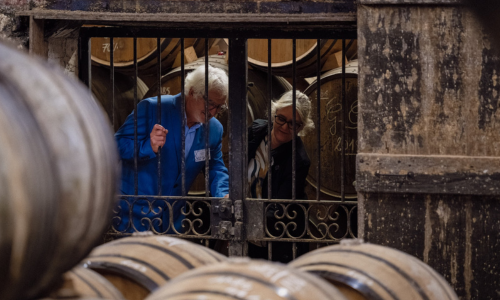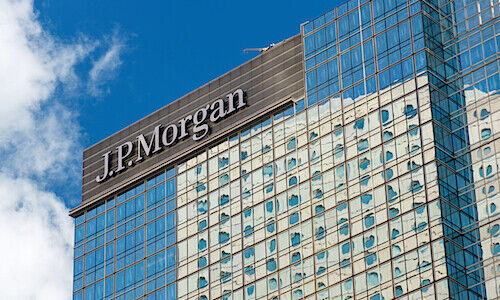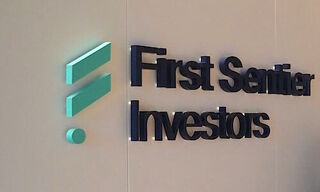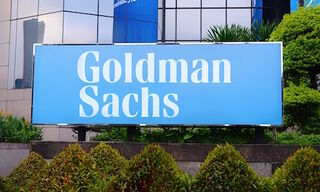Journey to the Heart of Cognac
Cognac holds a distinguished place among spirits. For centuries, this brandy from western France has symbolized refined elegance and joie de vivre. finews.asia visited the historic producer Delamain, which is celebrating its 200th anniversary this year, and has come up with something special for the occasion.
The essence of Cognac was captured in words by the French politician and diplomat Jean Monnet (1888-1979): «Cognac has always been a reference point in my reflections, which mature slowly, like the thinking of the people of Charente, who hold a deep respect for the work of time.»
Monnet was born in the town of Cognac, about an hour’s drive north of Bordeaux. The city lends its name to the world’s most famous brandy, which for centuries has been synonymous with luxurious enjoyment of spirits.
A Drink with a Distinct Character
To mark the 200th anniversary of Delamain, a company renowned for its particularly characterful Cognac, on the occasion of the 200th anniversary of Delamain, a company renowned for its particularly characterful Cognac.
In the village of Jarnac, home to 4,400 souls and birthplace of former French President François Mitterrand (1916-1996), Delamain’s headquarters seem frozen in time. The Église Saint-Pierre de Jarnac, a Romanesque church dating back to the 12th century, overlooks the charming village square. The surrounding houses, mostly built from yellow sandstone, appear to have stood unchanged for centuries.
Nine Generations of Cognac Expertise
Charles Braastad, the current Cellar Master («Maitre de Chai») at Delamain and son of Alain Braastad-Delamain (1939-2023), the former owner of Delamain, could likely recount the detailed history of every house in Jarnac. Some of his predecessors were avid historians of the area.
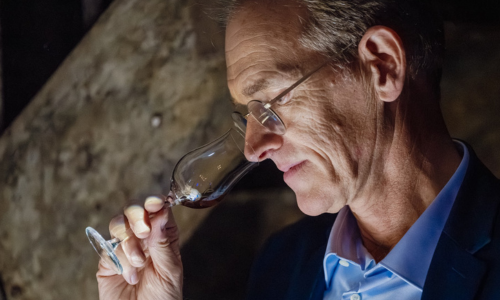
Current «Maitre de Chai»: Charles Braastad. (Image: Delamain, Courtesy)
The Delamain name has been associated with the Cognac region since at least 1625. Records show that in that year, a Huguenot named Nicolas Delamain emigrated to England for religious reasons, where he was knighted by King Charles I in 1639. The family’s coat of arms, an eagle rising above a golden shield adorned with three bloody crosses, still graces every bottle of Delamain Cognac to this day.
Founded in 1824
One hundred and twenty years later, James Delamain, a descendant of the family, returned to Cognac, where he married the daughter of brandy merchant Isaac Ranson and subsequently founded the Cognac company Ranson-Delamain. The firm did not survive long after James Delamain’s death in 1800 due to inheritance disputes.
In 1824, Anne-Philippe Delamain, a grandson of James Delamain, established the Cognac house Roullet & Delamain with representatives of the Roullet family. The Delamain family fully acquired the company in 1920, and this year it celebrates its 200th anniversary.
100,000 Bottles Annually
Today, with 18 employees, the company produces around 100,000 bottles annually. This is a tiny fraction compared to the volumes produced by Hennessy (100 million bottles per year), Rémy Martin (approximately 26 million bottles), or Martell (about 20 million bottles per year).
Though small in production, Delamain’s name is one of the most prestigious in the closely-knit world of Cognac, thanks to its distinguished history and unique product philosophy.
Author of a Definitive Work
The book Histoire du Cognac, published in 1935 by then-owner Robert Delamain (1879-1949), remains the definitive work on the spirit.
Now, in its ninth generation, it is up to Charles Braastad as Cellar Master to write the next chapters in the company’s history.
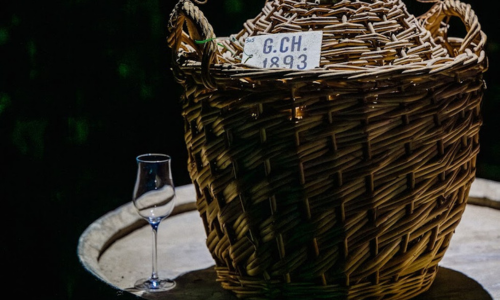
An Ingredient for the Anniversary Edition: Delamain Cognac from 1893. (Image: Delamain, Courtesy)
A Special Philosophy
To celebrate the company’s anniversary, Braastad has invited merchants and industry journalists to Jarnac to introduce them to the specifics of Delamain’s unique philosophy.
As is typical in the world of France’s most prestigious alcoholic beverages, the boundaries of what is permissible and desirable are narrowly defined. In the Cognac region, the Bureau National Interprofessionnel du Cognac (BNIC), the producers’ self-regulatory organization, ensures compliance with stringent regulations.
Brandy from the «Grande Champagne» Region
First, only wines from specific grape varieties and from a designated growing area can be distilled into products labeled Cognac. The region is divided into the «Grande Champagne» area, considered the highest quality, the «Petite Champagne,» and other adjacent areas with names like «Borderies,» «Fins Bois,» and «Bons Bois.» The «Bois Ordinaires» region, including La Rochelle, borders the Atlantic coast to the west.
(The terms Grande and Petite Champagne are indirectly related to the sparkling wine region east of Paris, as both areas have soils rich in limestone.)
Dominant Grape Variety
Only seven white grape varieties can be used to make Cognac, yielding a high-acid, light wine with an alcohol content of about 8 to 9 percent. The most prominent variety, accounting for about 98 percent of production, is «Ugni Blanc,» also known elsewhere as «Trebbiano.»
Wines from different areas of the Cognac region age differently in terms of their distilled spirits. Delamain sources barrels of brandy exclusively from the Grande Champagne area. These are particularly refined and have great potential for slow aging.
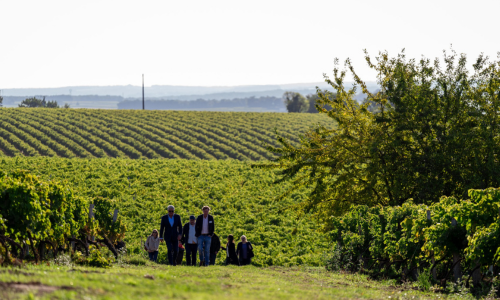
Delamain's Own Vineyard. (Image: Delamain, Courtesy)
The Secret of Slow Aging
A crucial part of the regulatory framework is the age classification: Cognacs labeled VS must be aged in oak barrels for at least two years, while «hors d’âge» must be aged for at least 30 years.
Delamain aims to produce an elegant Cognac that retains the fruity notes of the brandy. To achieve this, the distillates are aged in old, rather than new, oak barrels, where the aging process is slower and the barrels impart fewer dominant wood and vanilla flavors.
At Least 20 Years
As a result, the aging process takes longer. The company does not bottle spirits aged less than 20 years, explains Charles Braastad, the Cellar Master. Last year, he succeeded Dominique Touteau, who had worked for the company since 1980 and served as Cellar Master from 1992 to 2023.
The Cellar Master is the most important position at a Cognac producer. Most of the vineyards and distillation are managed by independent winemakers. Only later do producers enter the process, purchasing the aged barrels from growers and further maturing them until bottling. The Cellar Master monitors the entry and exit of barrels into the cellars.
Seven Different Cellars
Through tastings, he determines whether to acquire a barrel and, later, when it is ready for bottling. During the aging process, he moves it from one cellar to another to influence the interactions between the barrel, its contents, and the microbiomes (fungi, bacteria). Delamain has seven different cellars, each with its own temperature and humidity profile.
The barrels with the greatest aging potential are stored in a separate cellar at Delamain, secured with a double lock. Even the in-house Cellar Master can only open it in the presence of a representative from the Bureau National Interprofessionnel du Cognac, who holds the second key.
Historical Edition for the Anniversary
For the anniversary, the two Cellar Masters, Dominique Touteau and Charles Braastad, have created a special edition by delving deep into the historical depths of their cellars. The «Édition Rare du Bicentenaire» is an assemblage of five particularly characterful distillates from the years 1893, 1947, 1914, 1965, and 1969.
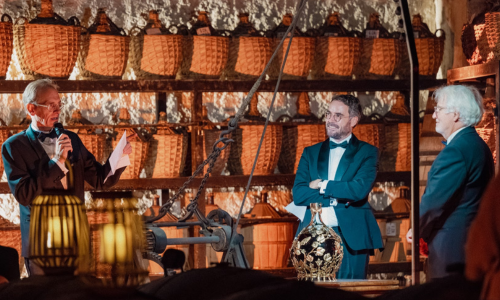
Unveiling of the «Édition Rare du Bicentenaire»: Cellar Master Braastad (left), his predecessor Touteau (right). In the center: Delamain General Director Éric Le Bouar.
The limited edition of 201 bottles will be available in specialty stores later this year. Before that, the auction house Bonhams will auction a 10-liter «Grande Jeanne» bottle of this historic spirit, intricately decorated by French goldsmith Goossens, in an online auction between November 19 and December 6.
Delamain’s products are imported to Singapore by Galiena Fine Wines and to Hong Kong by Summergate Fine Wine & Spirits. Next week, finews.asia will publish an interview with Gérard Bouleau, Deputy CEO of the «Groupe Bollinger,» which acquired a majority stake in the Cognac house Delamain seven years ago.

